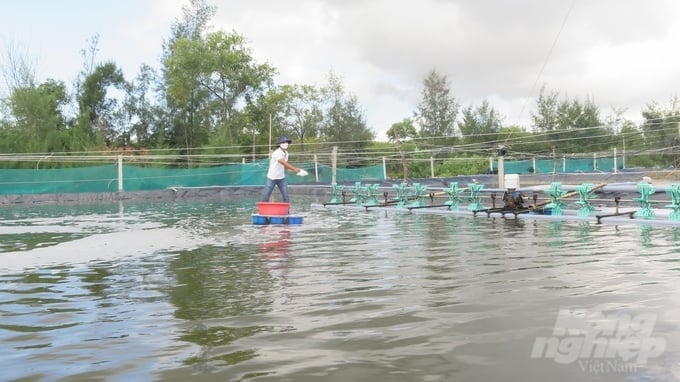May 21, 2025 | 03:06 GMT +7
May 21, 2025 | 03:06 GMT +7
Hotline: 0913.378.918
May 21, 2025 | 03:06 GMT +7
Hotline: 0913.378.918

Shrimp farmers in Thua Thien-Hue province are facing many difficulties due to environmental pollution and disease. Photo: Cong Dien.
According to the Department of Agriculture and Rural Development of Thua Thien-Hue, from the beginning of the year until now, due to complicated weather and environmental conditions, shrimp diseases have arisen and spread, causing tens of billions of VND in damage.
Statistics show that the area of shrimp ponds in the province affected by the disease is 44 ha, of which 16 ha of ponds are infected with white spot disease and 28 ha are affected by environmental conditions. The area of infected ponds is concentrated mainly in key shrimp farming districts such as Quang Dien, Phong Dien, Phu Vang...
As soon as the epidemic occurred, the Department of Agriculture and Rural Development of Thua Thien-Hue province gave instructions to the Animal Husbandry and Veterinary Sub-department to coordinate with the Agriculture and Rural Development departments and local authorities. This is to send technical staff to the area to inspect farming areas and treat infected shrimp ponds. The locality also promptly allocated 10 tons of national reserve Chlorine chemicals supported by the Ministry of Agriculture and Rural Development to prevent and control aquatic diseases.
According to Mr Le Van Anh, Deputy Director of the Department of Agriculture and Rural Development of Thua Thien- - Hue province, To prevent diseases, households and shrimp farming facilities need to do a good job of improving ponds, carrying out disinfection and purification of all water in the pond and related equipment before supplying water to the pond. In particular, disease-affected ponds should not continue to raise shrimp but should switch to raising other species to avoid the risk of reoccurring disease outbreaks.
Along with that, shrimp farmers also need to choose shrimp seeds with clear origins and are disease-free from reputable seed suppliers. Stock shrimp at appropriate density, use biological products to treat the water environment, and regularly monitor, and deliver early detection of epidemics to promptly notify local authorities and functional agencies to localize and suppress epidemics according to regulations.
Translated by Hoang Duy

(VAN) In 2024, over 295 million people across 53 countries and territories faced acute hunger—an increase of almost 14 million people compared to 2023, while the number of people facing catastrophic levels of hunger reached a record high.

(VAN) World Environment Day 2025 (June 5) carries the theme 'Beat Plastic Pollution' continuing to emphasize the global urgency of addressing the plastic waste crisis.

(VAN) This was the assessment shared by experts at the workshop titled 'Assessing the Role and Potential of Low-Emission Rice Production Systems in Vietnam,' held on the morning of May 19.

(VAN) Cai Rong Port is the fisheries control center of Quang Ninh, helping to monitor fishing vessels, combat IUU fishing, and remove the EC's 'yellow card'.

(VAN) The German Agricultural Society (DLG) explores the possibility of establishing a mechanization service center in Vietnam’s Mekong Delta to support farmers in accessing and utilizing advanced machinery.

(VAN) On May 16, the Department of Water Resources Management, in collaboration with the Food and Agriculture Organization of the United Nations (FAO), held a signing ceremony for the GEF-8 project document.

(VAN) Food safety, mechanization, vocational training, and market opening are key areas of cooperation expected between the Vietnamese Government and the Federal Republic of Germany.